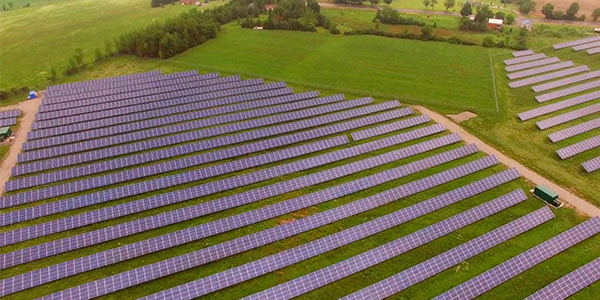By Rich Heidorn Jr.
FERC on Monday rejected a solar aggregator’s request for a waiver to offer 14 distributed energy resources into ISO-NE’s 2020 Forward Capacity Auction despite a dispute over the projects’ interconnection status (ER20-366).
Genbright had asked FERC to allow its seven solar PV generating facilities and seven storage facilities to participate in FCA14, which opened Monday.
ISO-NE rejected their participation because the developers had failed to file interconnection requests with the RTO.
Genbright said it believed it had met the interconnection requirement by applying to Eversource Energy under the utility’s Massachusetts-approved tariff.
But ISO-NE said the company should have filed interconnection requests under the RTO’s Tariff because the point of interconnection is under FERC jurisdiction.
Genbright, which was acquired by ENGIE North America last May, said ISO-NE’s FCA 14 training material required a valid interconnection request “regardless of the jurisdictional status of the project’s proposed interconnection.”

ENGIE solar farm | ENGIE North America
Genbright contended that the seven PV generators should not be subject to FERC jurisdiction because it will sell all its output to Eversource as a qualifying facility participating in the Solar Massachusetts Renewable Target.
It said “at least three, and perhaps all seven” of the storage facilities also are not subject to the RTO’s interconnection process.
Genbright said Eversource erroneously stated that the distribution line into which each project is interconnecting is subject to FERC jurisdiction because there is a pre-existing QF on the distribution line registered with ISO-NE as a settlement-only generator.
Genbright said neither Eversource nor ISO-NE informed it that Genbright had filed incorrect interconnection requests even though Eversource knew that the projects intended to participate in the RTO’s market.
Eversource and ISO-NE both opposed the waiver request.
Eversource said Genbright was asking for a substantive legal ruling on what causes a distribution-level interconnection to fall under commission jurisdiction rather than merely the correction of a one-time error. It said the company should have sought a declaratory order or rulemaking.
“If Genbright’s views on jurisdiction were correct, they would have far-reaching impacts on auction eligibility, jurisdiction over existing interconnection agreements and the appropriate queue for yet-to-be interconnected generators,” Eversource said.
ISO-NE said it welcomes DER in its markets. “Genbright’s resources, like any other eligible resources in New England, may fully participate in the ISO’s markets, but they must do so in accordance with the same rules that apply to all resources,” the RTO said. “The petition, however, seeks an arbitrary exemption from the Tariff on behalf of Genbright’s projects, an exemption Genbright simply has not justified.”
In denying the request, FERC said Genbright had failed to show the request was limited in scope. “Genbright’s requested waiver would allow the projects to avoid ISO-NE’s complex interconnection study process, including the system impact study, which is ISO-NE’s comprehensive reliability evaluation.”
Results of FCA 14 are expected as early as Wednesday.




